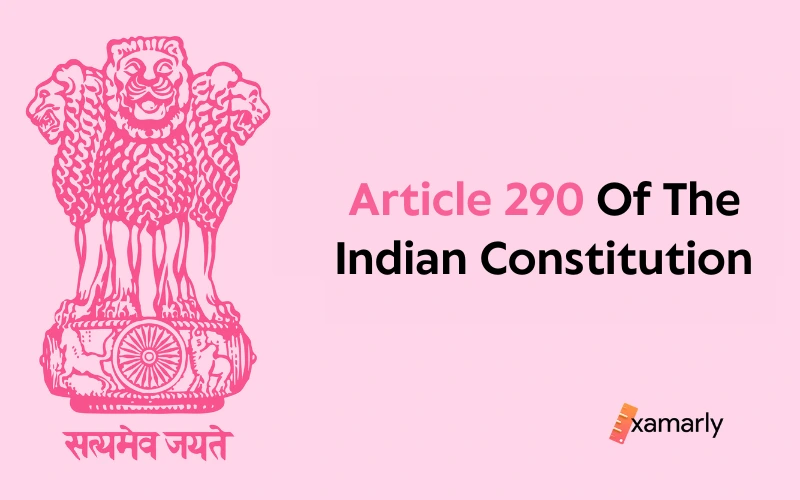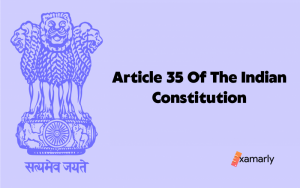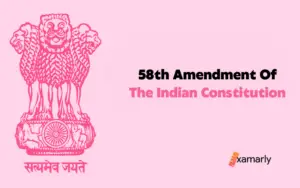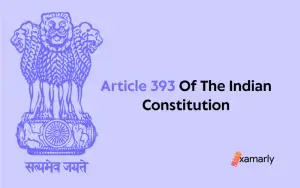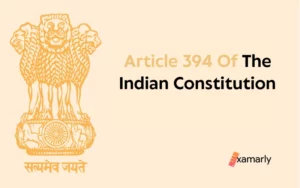An Overview
Welcome to our blog on the topic Article 290 of the Indian Constitution. This is a provision in the Indian Constitution that deals with how the expenses of certain courts or commissions, as well as pensions for the people who have served the government before or after the Indian Constitution was implemented, are to be paid for.
In this blog, we will delve into the details of this provision and explain how it works in practice. We will explore the implications of this provision for the State government and the Union government, as well as for the individuals and entities that are affected by it.
We will also look at the background and context of this provision, and its significance in today’s context.
If you are a Civil Services aspirant learning topics of the Indian Constitution or someone with a general interest in how the finances of the government are handled, this blog will provide you with an in-depth understanding of Article 290 of the Indian Constitution.
- An Overview
- What Does Article 290 Of The Indian Constitution Talk About?
- Background Of Article 290 Of The Indian Constitution
- Explanation Of Article 290 Of The Indian Constitution
- Article 290A Of The Indian Constitution: Provisions Related To Devaswom Funds
- Explanation Of Article 290A Of The Indian Constitution
- Constitutional Amendment Related To Article 290A Of The Indian Constitution
- Summing Up
- FAQs Related To Article 290 Of The Indian Constitution
- What Is An Adjustment In Respect Of Certain Expenses And Pensions?
- Why Is An Adjustment In Respect Of Certain Expenses And Pensions Necessary?
- Who Is Responsible For Making Adjustments In Respect Of Certain Expenses And Pensions?
- How Are Adjustments In Respect Of Certain Expenses And Pensions Made?
- What Is An Annual Payment To Certain Devaswom Funds?
- Why Is It Important To Make An Annual Payment To Certain Devaswom Funds?
- Who Manages The Devaswom Funds?
- How Is The Money From The Devaswom Funds Used?
What Does Article 290 Of The Indian Constitution Talk About?
The following article has been quoted from the official document of the Constitution of India. The following text is held as Article 290 of the Indian Constitution. It reads as follows:
Adjustment in respect of certain expenses and pensions.—
Where under the provisions of this Constitution the expenses of any court or Commission, or the pension payable to or in respect of a person who has served before the commencement of this Constitution under the Crown in India or after such commencement in connection with the affairs of the Union or of a State, are charged on the Consolidated Fund of India or the Consolidated Fund of a State, then, if—
(a) in the case of a charge on the Consolidated Fund of India, the court or Commission serves any of the separate needs of a State, or the person has served wholly or in part in connection with the affairs of a State; or
(b) in the case of a charge on the Consolidated Fund of a State, the court or Commission serves any of the separate needs of the Union or another State, or the person has served wholly or in part in connection with the affairs of the Union or another State,
there shall be charged on and paid out of the Consolidated Fund of the State or, as the case may be, the Consolidated Fund of India or the Consolidated Fund of the other State, such contribution in respect of the expenses or pension as may be agreed, or as may in default of agreement be determined by an arbitrator to be appointed by the Chief Justice of India.
Background Of Article 290 Of The Indian Constitution
- The Draft Article 267 was taken up for discussion in the Constituent Assembly on August 10, 1949. This Draft Article later became Article 290 of the Indian Constitution,
- The Draft Article said that the costs for any court, commission or individual who has worked for the State or the Union will be paid for by the State or the Union.
- Some members of the Assembly suggested changes to the wording of the article which would not alter the meaning of the article significantly. However, none of these changes were accepted. No further discussions were held with respect to this article.
- The article was approved on the same day, that is, August 10, 1949, without any further debate.
Explanation Of Article 290 Of The Indian Constitution
Article 290 of the Indian Constitution describes a provision for adjusting expenses and pensions in relation to certain courts or commissions. It also takes into account the people who have served under the Crown in India before or after the Indian Constitution was implemented.
The article states that these expenses or pensions are charged on the Consolidated Fund of India or the Consolidated Fund of a State government. If a court or commission serves the separate needs of a State or a person has served in connection with the affairs of a State and their expenses or pensions are charged on the Consolidated Fund of India, then the State government must pay a contribution towards these expenses or pensions.
The same applies if a court or commission serves the needs of the Union or of another State or if a person has served in connection with the affairs of the Union or of another State and their expenses or pensions are charged on the Consolidated Fund of a State.
If the State government and the Union government are not able to agree on the contribution that should be paid, then the matter will be determined by an arbitrator appointed by the Chief Justice of India.
Article 290A Of The Indian Constitution: Provisions Related To Devaswom Funds
In the official document of the Constitution of India, Article 290 is followed by another constitutional provision in the form of Article 290A of the Indian Constitution that was inserted later through an amendment act of the Indian Constitution. It reads as follows:
[290A. Annual payment to certain Devaswom Funds.—A sum of forty-six lakhs and fifty thousand rupees shall be charged on, and paid out of, the Consolidated Fund of the State of Kerala every year to the Travancore Devaswom Fund; and a sum of thirteen lakhs and fifty thousand rupees shall be charged on, and paid out of, the Consolidated Fund of the State of 2 [Tamil Nadu] every year to the Devaswom Fund established in that State for the maintenance of Hindu temples and shrines in the territories transferred to that State on the 1st day of November, 1956, from the State of Travancore-Cochin.]
Explanation Of Article 290A Of The Indian Constitution
The provisions of Article 290A suggests that it talks about an annual payment that is to be made from the Consolidated Fund of the State of Kerala and Tamil Nadu to certain Devaswom Funds. The Consolidated Fund of Kerala is to pay a sum of forty-six lakhs and fifty thousand rupees to the Travancore Devaswom Fund.
On the other hand, the Consolidated Fund of Tamil Nadu is to pay a sum of thirteen lakhs and fifty thousand rupees to a Devaswom Fund established in Tamil Nadu to maintain Hindu temples and shrines. This payment is to be made annually, that is once in a year, and it is specifically related to the Hindu temples and shrines that were transferred from Travancore-Cochin to Tamil Nadu on November 1, 1956.
Constitutional Amendment Related To Article 290A Of The Indian Constitution
Article 290A of the Indian Constitution was included in the Constitution of India at a later time. Its addition was possible because of the Constitution (Seventh Amendment) Act, 1956. The insertion of this article was mentioned in its Statement of Objects and Reasons.
Given the fact that this Article was not included in the Constitution until 1956, the Constituent Assembly did not have any deliberations over this Article.
You Might Also Like:
| Article 284 Of The Indian Constitution | Article 285 Of The Indian Constitution |
| Article 286 Of The Indian Constitution | Article 287 Of The Indian Constitution |
Summing Up
After giving Article 290 of the Indian Constitution a thorough read and analysis, we can come to some conclusions. The key learnings we gathered from this blog have been listed below.
- Article 290 of the Indian Constitution is about how the expenses of certain courts and commissions, and pensions for people who served before or after the Indian Constitution, are paid.
- The article also talks about how the State government and the Union government will contribute towards these expenses and pensions. If they can not agree on the contribution, the matter will be decided by an arbitrator.
- The Chief Justice of India has the responsibility and authority for appointing the arbitrator.
- In addition to that, Article 290A of the Indian Constitution requires the State government of Kerala and Tamil Nadu to pay a specific amount of money every year to funds that support and maintain the Hindu temples and shrines.
- The provisions of Article 290A particularly refer to those Hindu temples and shrines that were transferred from Travancore-Cochin state to Tamil Nadu on November 1, 1956.
- The amount of money is forty-six lakhs and fifty thousand rupees from the State of Kerala and thirteen lakhs and fifty thousand rupees from the State of Tamil Nadu. These amounts are charged on the Consolidated Fund of the respective states.
FAQs Related To Article 290 Of The Indian Constitution
What Is An Adjustment In Respect Of Certain Expenses And Pensions?
An adjustment in respect of certain expenses and pensions refers to the process of making changes to the amount of expenses or pensions that are currently being paid out or allocated. This can include increasing or decreasing the amount of money being paid, or making changes to the specific expenses or pensions that are covered.
Why Is An Adjustment In Respect Of Certain Expenses And Pensions Necessary?
Adjustments in respect of certain expenses and pensions may be necessary for a variety of reasons. It could be changes in the cost of living, changes in the financial situation of the organisation or government providing the expenses or pensions, or changes in the needs or circumstances of the individuals receiving the payments.
Who Is Responsible For Making Adjustments In Respect Of Certain Expenses And Pensions?
The responsibility for making adjustments in respect of certain expenses and pensions typically falls to the organisation or government that provides the payments. This can include government departments, financial institutions, or other organisations that administer pension or expense programs.
How Are Adjustments In Respect Of Certain Expenses And Pensions Made?
Adjustments in respect of certain expenses and pensions can be made through a variety of methods. It could be by bringing about changes to legislation or regulations, negotiations with employee unions or other representatives, or review and revision of program budgets. The specific process for making adjustments will vary depending on the organisation or government responsible for providing the expenses or pensions.
What Is An Annual Payment To Certain Devaswom Funds?
An annual payment is a recurring contribution made to certain Devaswom Funds. These funds are used to support the maintenance and upkeep of Hindu temples and related institutions.
Why Is It Important To Make An Annual Payment To Certain Devaswom Funds?
Annual payments to Devaswom Funds are used to support the daily operations of the temples and institutions they are associated with. This includes the maintenance of the temple buildings and grounds, the support of temple priests and staff, and the funding of various religious and cultural activities. These payments are an important way for devotees to support and maintain their religious heritage.
Who Manages The Devaswom Funds?
Devaswom Funds are managed by the Devaswom Board. It is a government controlled body which is responsible for administration and management of different temples and related institutions.
How Is The Money From The Devaswom Funds Used?
The money from the Devaswom Funds is used to support the daily operations of the temples and institutions they are associated with. This includes the maintenance of the temple buildings and grounds, the support of temple priests and staff, and the funding of various religious and cultural activities.


